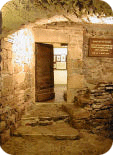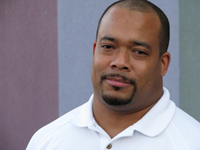
After only 4 years in Canada, and already 14 years in Europe some North American Christian traditions are still strong to me. Although Candles services are originally from Europe, they are almost forgotten in France.
I still remember with emotion the lovely Candle services at the Wolfville Baptiste Church, the town church that hosted me during my 4 years in Canada. . The main goal of candle services, to stop and think about the true meaning of Christmas, was reached beautifully each 24th of December. As a forerigner this is an unforgottable memory for me.I am a reformed hearted fellow but I really enjoyed my 4 Baptists years in Canada. I miss that lovely church I hope I will be able to visite them again one day.
So 14 years later I am an elder in a little and humble Evangelical Reformed local church in the south of Paris.
Unlike Wolfville in NS Canada which is a 4000 people lovely town, Paris and its suburbs are 20 million people!!. In Wolfville the 24th of December we smiled people warmly at the streets, most of them would already had finished a day before their shopping, and a few of them who hadn't yet, they would finished it way before 5h00 pm, at 5h30 pm every thing was closed and every body went home, so we took hot chocolate or a cappuchino and enjoyed the first snow flakes. At that season Canadians don't call it "snow", they call it "White Christmas." So we just enjoyed the season feelings and prepared ourselves for a lovely Candle Services at 7h00 pm.
Paris the 24th of December is just awful, and up 50% or probably 70% of Parisians are still buying their presents until midnight. Shops are crowded, and streets are jammed. There is a little probability of snow, yet it is very cold outside, moisty cold. People are stressed and very distracted, and it goes like that until probably 8h00 pm or later. Oddly enough Paris had snow this year, but a week early, and the 24th it had already melted and we had only plain cold rain :-(
So a candle service in Paris can have too a deep meaning; to stop our rushness and to think about the true meaning of Christmas. So I started candle services traditions at my church almost 7 years ago, and although we do not follow the same North American style, year after year a small crowd of our church manages to challenge trafique jams, crowed streets and last minute shopping and come at 7h00 to sing, pray and praise the Lord and to remember the true mining of Christmas.
So I had the Christmas Eve mediation privilege and again we read Luke history of nativity for a thousand time, yet a thousand time later three phrases will never ever stop to amaze me.
Luke 2
· (7)…. and wrapped him in swaddling clothes,....
Like any child… like any human child…. God almighty became flesh and as any baby He was wrapped in swaddling clothes. How can we sometimes forguet the awe of Christmas?
· (7)…….. and laid him in a manger; because there was no room for them in the inn
There was no room for him!!!! I wonder if now days He has room in our Christmas, in our life, in our schedules, in our logics, in our way of being Christians!!
· (15) the shepherds said one to another, Let us now go even unto Bethlehem, and see this thing which is come to pass, which the Lord hath made known unto us
The good news was addressed first to simple people, forgotten and outcasted people. Shepards were indeed the lowest class popiluation of their time, poor, ignorants, illiterates, impure and unworthy to be part religious life of their time. Indeed forgotten people of their time doing and unworthy job. Would I be part of these people at the time? would I be part of the first people that God had choosen to deliver the first good news? and if so I wonder if I had probably missed the whole thing stuck in traffic jam!!
I love buying presents and I love giving them. I get caught in my feelings when my kid opens his presents and loves them, I love my huge natural Christmas tree that I buy each year since my Canadian days between 2m and 3 m) I am proud of all the Christmas lights I set up at home. I do love all these things... Yet I should never forget these three messages that Luke story tells us of the fist Christmas . Otherwise, I will just miss the whole point just as if I would spent my whole Christmas in a Parisian traffic jam. Lots of light, lots of noise... even lots of beautiful things to see outside in the street, yet a stressful, useless and meaningless waste of time.

























